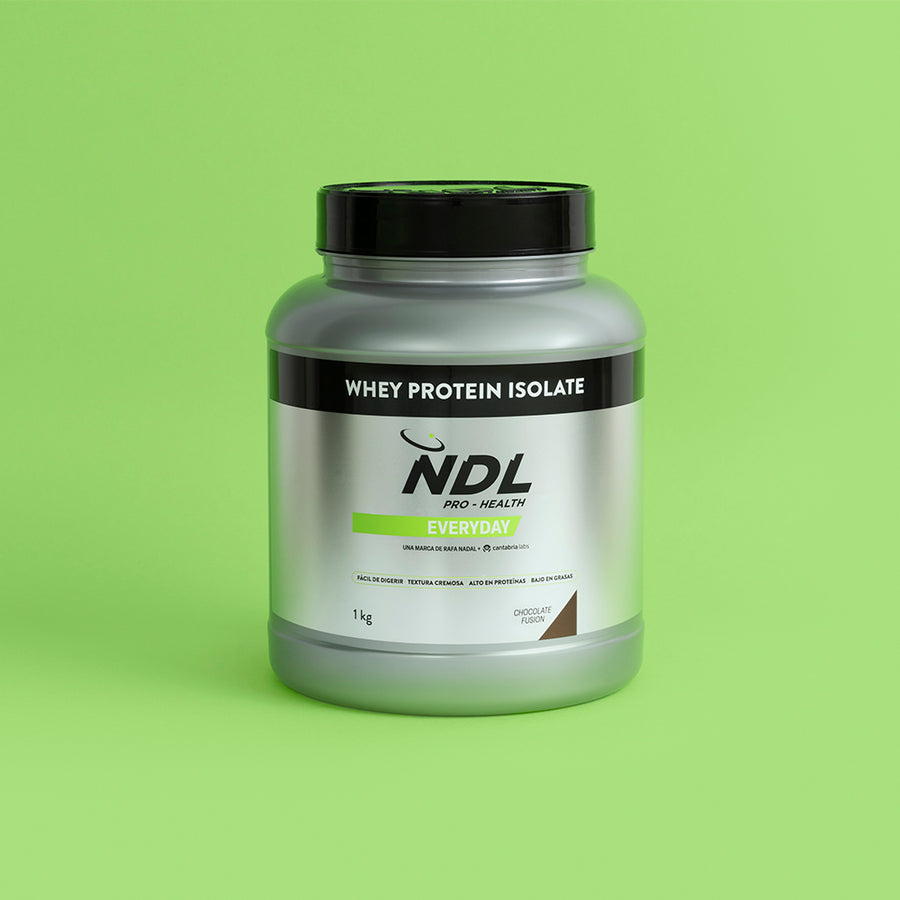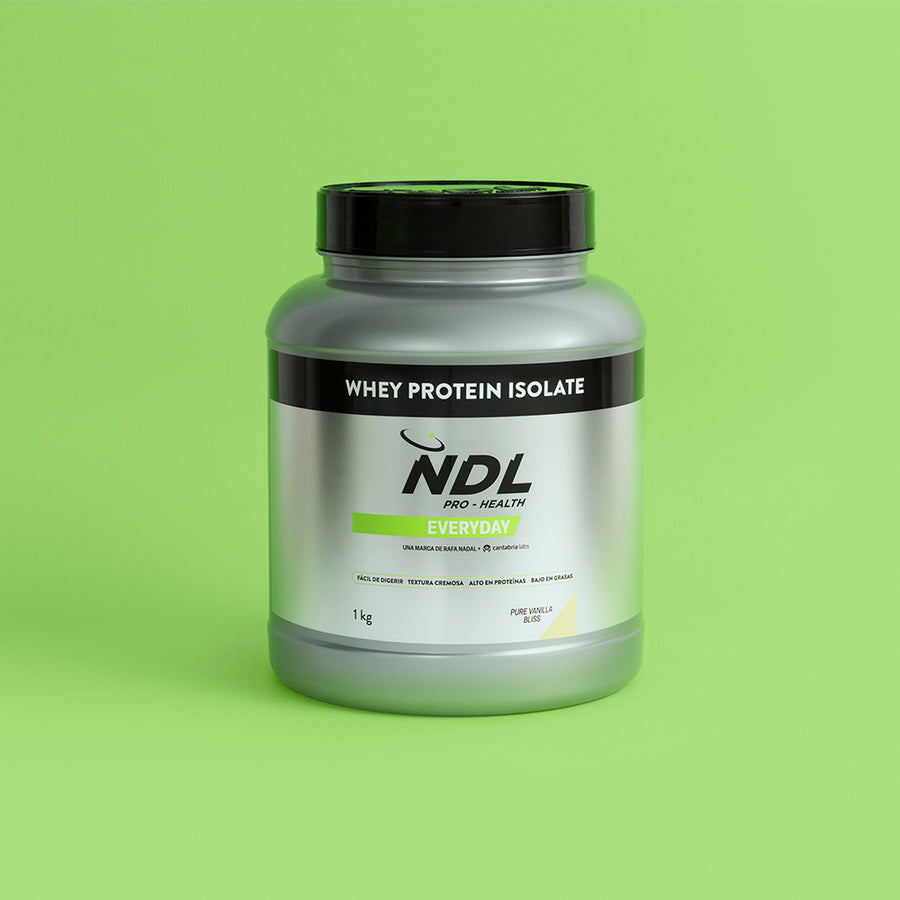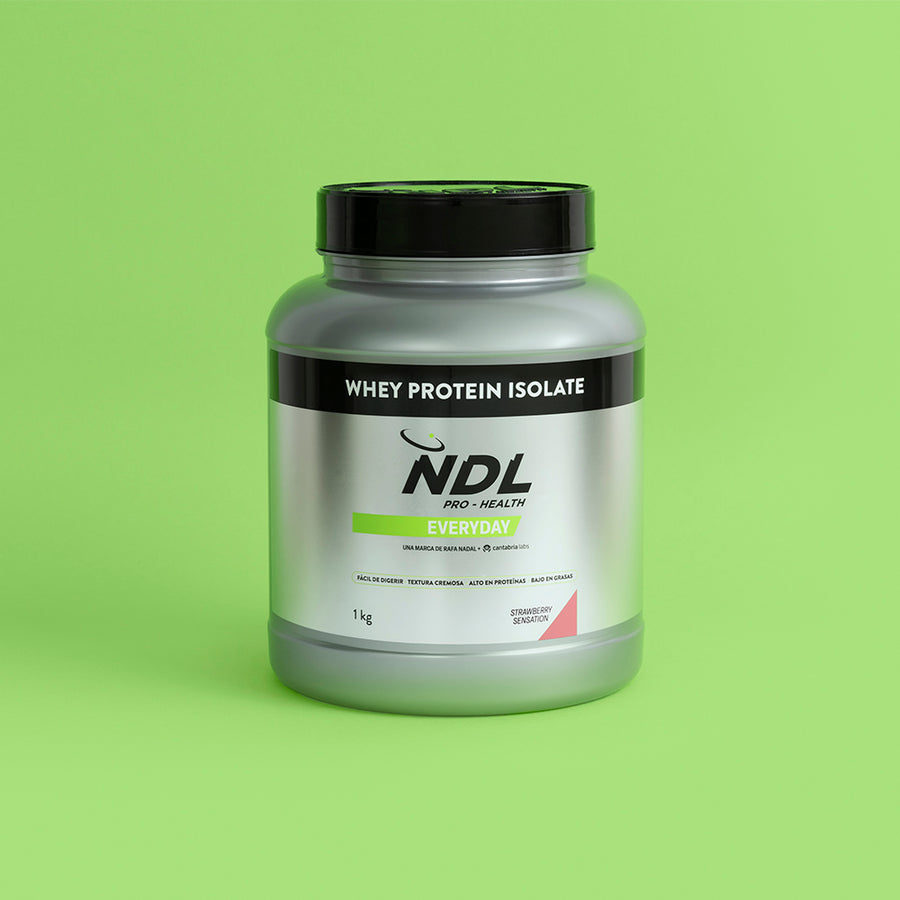Featured Products

Whey Protein Isolate
See product
Whey Protein Isolate Pure Vanilla Blis
See product
Whey Protein Isolate Strawberry Sensation
See productProtein is an essential nutrient in the diet, fundamental for growth, repair, and maintenance of body tissues. It is composed of amino acids, which are the building blocks of muscles, skin, organs, and other structures in the body.
In addition to its structural role, proteins are key in the production of enzymes and hormones, which regulate crucial metabolic and physiological functions.
Types of Protein on the Market
On the market, there are several types of proteins, each with specific characteristics and benefits.
Below are descriptions of the main types of proteins available:
Whey Protein
Whey protein is a protein supplement derived from whey, a liquid by-product of cheese production. It is a complete protein, meaning it contains all the essential amino acids that the body cannot produce on its own. Whey Protein is available in various forms, the main ones being:
- Whey Concentrate: Contains 70-80% protein, along with some lactose and fat.
- Whey Isolate: Contains 90% or more protein, with less lactose and fat, making it purer.
- Whey Hydrolysate: Pre-digested protein, which facilitates absorption, ideal for people with intolerance or for clinical use.
Benefits of Whey Protein
- High Bioavailability and Fast Absorption: Whey Protein is digested and absorbed quickly, making it an excellent option for consumption after exercise, facilitating muscle repair and growth.
- Rich in Essential Amino Acids and BCAAs: It is particularly high in branched-chain amino acids (BCAAs) like leucine, which is crucial for muscle protein synthesis.
- Weight Loss Support: It can help reduce appetite and increase satiety, making it easier to control calorie intake.
- Muscle Mass Improvement: Combined with resistance training, Whey Protein is effective in increasing muscle mass and strength.
- Immune System Support: Contains immunoglobulins and lactoferrin, which can support immune function.
- Improvement in Body Composition: Helps to preserve lean muscle mass while losing body fat, improving overall body composition.
Here are some common uses of this protein:
- Post-Workout: Consuming Whey Protein after exercise helps accelerate muscle recovery and optimize muscle growth.
- Meal Replacement Shakes: Used in shakes to complement the diet, providing a quick and convenient source of protein.
- Increase in Protein Intake: Ideal for people who struggle to meet their daily protein needs through whole foods alone.
- Weight Loss Support: Can be included in weight loss programs to help maintain muscle mass while losing fat.
- Healthy Cooking: Whey Protein can be added to recipes such as pancakes, muffins, or energy bars to increase their protein content without adding many calories.
Whey protein is one of the most studied and popular supplements in the world of fitness and nutrition, recognized for its effectiveness in improving health and physical performance.
Casein Protein
Casein protein is the main protein in milk, making up about 80% of the protein content of cow's milk. Unlike whey protein, casein is much slower to digest, allowing for a gradual and sustained release of amino acids into the bloodstream.
This slow digestion process is due to the formation of a gel in the stomach when casein mixes with stomach acids, delaying its absorption.
Casein is also a complete protein, meaning it contains all the essential amino acids the body needs for vital functions.
Benefits of Casein Protein
- Prolonged Amino Acid Release: Due to its slow digestion, casein provides a sustained release of amino acids over several hours, ideal for preventing muscle catabolism (muscle breakdown), especially during long periods without food, such as overnight.
- Prevention of Muscle Catabolism: Casein's ability to release amino acids slowly helps maintain a positive protein balance in the body, preventing muscle breakdown, especially during fasting or sleep.
- Support for Muscle Recovery: Consumed after exercise or before bed, casein can contribute to better muscle recovery and protein synthesis during rest hours.
- Improvement in Body Composition: Casein has been shown to be effective in promoting fat loss while maintaining muscle mass, improving body composition.
- Calcium Source: In addition to being a protein source, casein is rich in calcium, an essential mineral for bone health.
Here are some common uses of casein protein:
- Consumption Before Bed: Due to its slow digestion profile, casein is ideal to consume before bed. This ensures a steady supply of amino acids overnight, aiding in muscle repair and growth while you sleep.
- Between Meals: Casein can be used as a snack between meals to maintain the supply of amino acids throughout the day and prevent muscle breakdown.
- In Weight-Control Diets: Due to its satiating effect, casein can help control appetite and reduce calorie intake, making it useful in weight loss diets.
- High-Protein Recipes: Casein can be incorporated into high-protein recipes like shakes, puddings, and desserts, thanks to its thick texture, which is ideal for preparing denser foods.
- Complement in Training Regimens: Athletes and active individuals often consume casein as part of their protein regimen to ensure a continuous release of amino acids, especially during intensive or endurance training.
Casein protein is especially valued for its ability to provide a steady supply of essential nutrients, making it a perfect supplement for people looking to optimize recovery and preserve muscle mass, particularly during long periods without food intake.
Plant Protein
Plant protein is a source of protein derived from plants such as soy, pea, rice, hemp, and chia, among others. Unlike animal-based proteins, plant proteins are more sustainable and are a popular choice among vegans, vegetarians, and people with food intolerances.
Plant proteins can be complete or incomplete. A complete protein contains all essential amino acids, while an incomplete protein lacks one or more of these amino acids. Some plant proteins, like soy, are complete, while others, like rice or pea, need to be combined to obtain a complete amino acid profile. Common types of plant protein include:
- Soy Protein: One of the few plant proteins that is complete, with an amino acid profile similar to animal protein.
- Pea Protein: Rich in BCAAs, it is not complete but is hypoallergenic and easy to digest.
- Brown Rice Protein: Rich in amino acids, though low in lysine, so it is often combined with other plant proteins.
- Hemp Protein: Contains all essential amino acids but in lower proportions than animal proteins.
- Chia Protein: High in fiber and omega-3s, but not a complete protein.

Benefits of Plant Protein
- Suitable for Vegans and Vegetarians: Plant proteins are an excellent option for people following plant-based diets, providing a protein source without animal products.
- Environmental Sustainability: The production of plant proteins generally has a lower environmental impact compared to animal protein production, making them a more eco-friendly choice.
- Lower Risk of Allergies: Plant proteins, especially pea and rice, are hypoallergenic, making them suitable for people with milk, egg, or soy allergies.
- High in Fiber and Phytonutrients: Many plant proteins, such as chia and hemp, are rich in fiber, antioxidants, and healthy fats, contributing to better digestive and cardiovascular health.
- Easy on Digestion: Plant proteins are often easier to digest for some people compared to animal proteins, especially for those with dairy sensitivities.
- Weight Loss Support: Being rich in fiber, plant proteins can increase satiety, helping to control appetite and facilitate weight loss.
Here are some common uses of plant protein:
- Protein Shakes and Supplements: Plant proteins are commonly used in shakes as a dietary supplement to increase protein intake, especially for vegans and vegetarians.
- Complement in Plant-Based Diets: Essential for those following plant-based diets, ensuring adequate protein intake without animal products.
- Healthy Cooking and Baking: Plant proteins can be added to recipes such as pancakes, muffins, bread, and energy bars to increase protein content in a healthy way.
- Meat Substitutes: Some plant proteins, like soy (in the form of tofu or tempeh), are used as meat alternatives, providing a similar texture with high protein content.
- Sports Nutrition: Athletes and active individuals use plant proteins for recovery and muscle growth, especially when looking to avoid animal products or have food allergies.
Plant proteins offer a nutritious and sustainable alternative to animal proteins, meeting various dietary needs and contributing to a more balanced and environmentally friendly diet.
Egg Protein
Egg protein is obtained primarily from egg whites, although some versions may include the yolk to take advantage of its nutritional content. It is a high-quality and complete protein, meaning it contains all the essential amino acids that the body needs for tissue maintenance and growth.
Egg protein has a particularly favorable amino acid profile, with a high concentration of leucine, a key amino acid for muscle protein synthesis.
Egg protein is considered one of the best protein sources due to its high bioavailability and digestibility. It is a popular option for people looking for an effective, lactose-free protein source.
Benefits of Egg Protein
- Complete Protein High in Essential Amino Acids: Contains all essential amino acids, making it an excellent option for muscle growth and repair.
- High Digestibility: Egg protein is efficiently digested and absorbed, maximizing amino acid availability for the body.
- Ideal for People with Food Intolerances: Being lactose- and gluten-free, it is suitable for people with intolerances or allergies to these components.
- Low in Fat and Carbohydrates: Egg whites, which are the base of most egg protein supplements, are virtually free of fat and carbohydrates, making them ideal for low-calorie diets or those seeking a pure protein source.
- Promotes Satiety: Like other protein sources, egg protein helps increase feelings of fullness, which can be beneficial for weight control.
- Benefits for Cardiovascular Health: Being low in cholesterol (when based solely on egg whites) and rich in nutrients such as riboflavin and vitamin B12, it can support cardiovascular health.
Common Uses
- Protein Shakes: Egg protein is used in protein shakes to increase protein intake, especially after workouts to support muscle recovery.
- Protein Supplements: It is commonly found in powder form for those seeking an alternative to dairy or plant proteins, with high nutritional quality.
- Cooking and Baking: Egg protein powder can be used in various recipes, such as pancakes, muffins, and breads, to increase protein content without significantly altering taste or texture.
- Sports Nutrition: Athletes and active individuals use egg protein as part of their supplementation regimen to improve performance and muscle recovery.
- Alternative for Restricted Diets: It’s an excellent option for people with soy or dairy allergies, who seek a complete and easily digestible protein source.
- Enriched Foods: It is used in the food industry to enrich products such as energy bars, baked goods, and snacks, improving their protein profile without adding many calories.
Egg protein is valued for its balanced nutritional profile and high digestibility, making it a versatile and effective protein source for both athletic performance and general nutrition.
Meat Protein
Meat protein is a supplement derived from animal sources, typically from beef. It is obtained through a process of cooking, dehydration, and subsequent pulverization of meat, resulting in a concentrated protein powder.
Unlike dairy or plant proteins, meat protein is naturally rich in essential amino acids and other nutrients such as creatine, which is beneficial for athletic performance.
This type of protein is an option for those looking to avoid dairy, eggs, or plant proteins and who want a protein source that offers an amino acid profile similar to whole meat, without the fat content that typically accompanies meat.
Benefits of Meat Protein
- Rich in Essential Amino Acids and BCAAs: Meat protein contains all essential amino acids, including a high concentration of branched-chain amino acids (BCAAs), which are crucial for muscle recovery and growth.
- High in Natural Creatine: Unlike other protein powders, meat protein contains natural creatine, which can help improve strength, athletic performance, and muscle recovery.
- Low in Fat and Carbohydrates: This supplement is a concentrated protein source with minimal fats and carbohydrates, ideal for those seeking to increase protein intake without adding many calories.
- Alternative for People with Intolerances: It is suitable for people who are lactose or gluten intolerant and looking for high-quality protein without ingredients that could cause adverse reactions.
- Support for Muscle Recovery: Meat protein is effective in supporting muscle recovery after exercise, thanks to its content of BCAAs and creatine, which together help repair muscles and improve protein synthesis.
- Promotes Lean Muscle Mass: Helps increase lean muscle mass, especially when combined with a resistance training regimen, while minimizing body fat gain.
Common Uses
- Post-Workout Shakes: Meat protein is commonly used in shakes after workouts to take advantage of its quick absorption profile and support muscle recovery and growth.
- Supplement for Athletes and Bodybuilders: It is popular among bodybuilders and athletes who seek an additional source of creatine and BCAAs to enhance performance and muscle development.
- Increase in Protein Intake: Ideal for people needing to increase their daily protein intake, such as in diets to gain muscle mass or for recovery after injuries.
- Low-Carb and Low-Fat Diets: An excellent addition to low-carb or ketogenic diets, where the goal is to maximize protein intake without adding sugars or fats.
- Healthy Cooking and Baking: Can be incorporated into recipes such as pancakes, muffins, or breads to add a high protein content without significantly affecting flavor or texture.
- Support in Weight Loss Programs: Thanks to its high protein content and low calories, it is useful in weight loss programs to maintain muscle mass while reducing body fat.
Meat protein is valued for its high protein quality, natural creatine content, and ability to support both muscle growth and recovery, making it a solid option for athletes and people seeking alternatives to dairy or plant proteins.
Use Cases
This table summarizes user profiles and recommended proteins, along with their main reasons and alternatives, making it easier to select the most suitable protein supplement according to your needs.
User Profile |
Recommended Protein |
Main Reason |
Alternatives |
Athletes |
Whey Protein |
Fast absorption for post-workout muscle recovery |
Egg Protein, Meat Protein |
People Seeking to Build Muscle Mass |
Whey Protein |
Maximizes protein synthesis and muscle growth |
Meat Protein, Egg Protein |
Vegans and Vegetarians |
Plant Protein |
Complete protein source without animal products |
Combination of Plant Proteins, Hemp or Chia Protein |
People with Food Intolerances |
Egg Protein |
Lactose- and gluten-free, high-quality protein |
Meat Protein, Plant Protein (Pea or Rice) |
People Who Train at Night |
Casein Protein |
Slow amino acid release to prevent nighttime catabolism |
Combination of Proteins (Whey + Casein) |
People Seeking Weight Loss |
Casein Protein |
Promotes satiety and helps control appetite |
Plant Protein (Soy or Pea), Whey Protein |
Bodybuilders and Weightlifters |
Meat Protein |
High in natural creatine and BCAAs for maximum muscle and strength gains |
Whey Protein, Egg Protein |
People on Low-Carb or Ketogenic Diets |
Meat Protein |
Low in carbs and fats, ideal for ketogenic diets |
Egg Protein, Whey Protein Isolate |
People Needing a Versatile Supplement for Cooking |
Egg Protein |
Easy to incorporate into recipes without altering texture or flavor |
Plant Protein (Rice or Pea), Casein Protein |
In conclusion, knowing the different types of proteins and their benefits is key to choosing the right supplement according to your health goals and lifestyle. From the fast absorption of whey protein to the sustained release of casein, and sustainable options like plant protein, each type offers unique benefits that can optimize nutrition and physical performance. Choosing the right protein, whether for muscle gain, weight loss, or simply to supplement a specific diet, can make a big difference in your overall well-being and achieving your health goals.

From the NDL Pro-Health team we will provide you with tips to maintain a healthy lifestyle. Sharing knowledge and product recommendations to offer optimal solutions for your daily routine, for your workouts and subsequent recovery, all with the goal of helping you achieve physical and mental wellness.

















